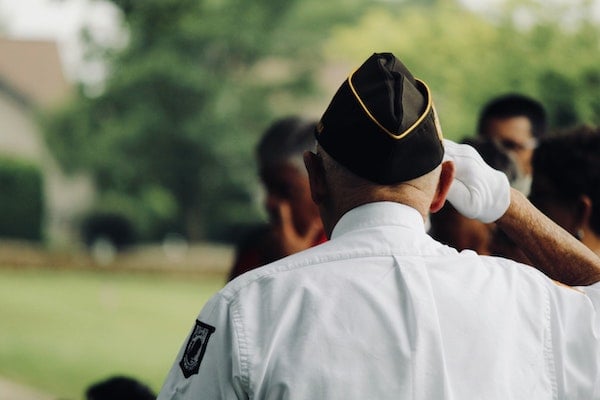Published on
Why Student Veterans Need to be a Part of the Conversation

Coming out of the military, many veterans head back to school but are faced with the unique challenges that come with being a student veteran. Oftentimes, their experiences are ignored and undervalued. Instead, institutions should see veterans as an asset to the college culture. In this interview, Katie Sullivan and Kay Yoon discuss the findings from their study on veteran students, what it means to become military-friendly, and how higher ed leaders can focus more on these lifelong learners.
Sullivan and Yoon researched this topic and had their work published in the Journal of Continuing Higher Education (JCHE), the academic publication of the Association for Continuing Higher Education.
The EvoLLLution (Evo): Why was the experience and needs of veterans who are entering their postsecondary studies after service a topic of interest for you?
Katie Sullivan (KS): We had a new faculty orientation at our institution, which is very military-friendly. During that orientation, there was a panel of student vets talking to faculty about how we can support them in the classroom and the challenges they face. What was striking was that the conversation really went down this path that centered on challenges. We heard a lot about traumatic brain injury, post-traumatic stress disorder, and the challenges in acculturating to university after being in the military.
As these student veteran stories came out, we also learned that many were getting their PhDs and Masters’ with high achievement. They’ve traveled to multiple countries and had all these experiences. We left the panel reflecting on everything that they said, how they’ve faced these challenges but have also managed to find great success in the process.
We wanted to know why we hadn’t heard more stories like this, so we dug into it a little more out of academic curiosity. We learned that this deficit in conversation is primary. We aren’t the only ones to write about student veterans’ strengths, but the conversations isn’t as loud as it should be.
Kay Yoon (KY): At this panel, the students were very articulate in expressing their experiences and perspectives. They pointed out how they had to adjust and use multiple frames of references across different contexts. So, we were really interested in looking more into their communication-centered behaviors or perspectives.
Evo: What are your definitions or characteristics in how you would define “military-friendly”?
KS: In our research and in how we conceptualized even calling our own university military friendly, it really comes down to the types of support offered to student veterans on campus. Is there a student veterans office? Can they access financial support? Are there places exclusively for student veterans? We have that at our campus, which can be wonderful. However, from our research interests, especially around strengths and inclusion, these can work to separate these students from the university culture. The marketing side of military friendly can be used in ways that might be surface-level or coercive around selling the institution, but we’ve really used it as a way to mark certain institutions that offer support.
KY: I learned that that phrase has been used in the literature about military students to describe the types of support available to them in higher educational institutions. For example, many people make a big deal out of the priorities given to military students when it comes to class registration. It is a big factor when it comes to characterizing the supports that institutions offer. The literature in the academic world is highly focused on those kinds of supports when it comes to which institutions are more military-friendly and how we can be more military-friendly in our supports.
Evo: What are some aspects of your research that you found surprising?
KY: For our study, we employed both a survey and interview method. In the survey portion, we looked at whether or not there’s a relationship and causality between how student veterans perceive their experience as their strength and how these experiences actually affect their academic performances. What was interesting was that the strengths they’ve identified based on their military experience improved their self-efficacy and academic motivations. There was clear evidence of how strength-based, self-perception would actually lead to more positive academic outcomes.
KS: I conducted our interviews, and in the 18 interviews, the student veterans were really engaged in this topic. One of the main questions I asked was: “What strengths did you gain in the military that you feel helped you succeed at university or that you use here?” The answer was very consistent. The students believe that they’re strong in diversity and cultivating diverse cultures. They feel like they can work with anybody, not only globally but also with people from all walks of life.
They find that they can focus on shared goals and the tasks at hand, and get along with others because they are used to being part of a team. They also discussed their drive, motivation and leadership skills. What we found pleasantly surprising was how they talked about communication as a strength. Military communication is hierarchical; it’s goal oriented, direct, and sometimes a little bit profane. In a professional setting, we wouldn’t always think of it as a strength. Alongside that, they’re also able to contextualize communication. They can alter how they speak based on who they’re speaking to. For them, it was one of the key ways in which they navigated the shift from military to university cultures.
Evo: What are some of the main things that you hope an institution level leader would take away from reading your work on this population?
KY: We can think about two different ways in which we can use our research findings in a higher education context. One is more at the micro level in the classroom by having direct conversations with veteran students. Instructors, researchers or administrators working directly with veteran students should consider the strength-based model that we’re advocating. It can be practiced and implemented in the classroom. An important finding in our research was that students recognize very clear areas of strength that they gained in the military. And they’re very open to talking about those experiences. It’s a huge resource for instructors and their non-service peers in the classroom.
What we might want to think about as educators and administrators in this space in how can we draw on those strengths in our conversation. If students have a tremendous number of leadership abilities and experiences from the military, how can that be harnessed in the classroom? In what ways can those kinds of strengths be recognized and even publicized in the classroom? Those are very practical, micro-level questions we can ask ourselves.
On the macro level, we can think about how to reshape our conversation around student veterans at the institutional level. The primary and predominant discourse around student veterans is really based on deficits, challenges, and the supports they need.
KS: For some of these students, it can be frustrating to be on a team with the more traditional 18-year-old students. These veterans have had so much more life experience, so they’re not always on the same page. They’ve said that they would really appreciate being invited to be additional instructors. They could coach more traditional-aged students on how to stay goal-oriented and how to communicate in a team. Given our findings on contextualized communication and student veterans’ orientation toward hierarchy, the best thing that faculty support staff administrators can do is invite them to take on that role. They have these experiences that strengthen our culture and certainly help students who haven’t had those experiences excel.
Evo: What are the next steps in the research process—where do we go from here?
KS: When you finish the article, there’s a moment of peace. But then you think, “What’s next?”. What Kay and I have found is that we really need to continue doing more empirical work on strengths. We’re certainly not the only ones writing on this topic, but the mass publications aren’t. It would be great, in addition to empirical studies, to invite student veterans to participate in focus groups. So, if a university changes the conversation, creates new materials, has a different platform for discussions, we get the student veterans’ perspective on it? It’s important to make student veterans collaborators and partners in these changes.
KY: Building on more empirical studies is really important. To the best of our knowledge, in the current literature on student veterans, very few studies looking at students’ strengths are primarily grounded on qualitative studies with small samples. Those are absolutely critical and offer a lot of insight that we have otherwise. It is rare to find larger survey studies or findings that could be generalized across institutional contexts. It would be neat to conduct more studies with larger sample sizes across institutions; there’s a lot more to learn about this population.
This interview was edited for length and clarity.
Disclaimer: Embedded links in articles don’t represent author endorsement, but aim to provide readers with additional context and service.
Author Perspective: Educator



